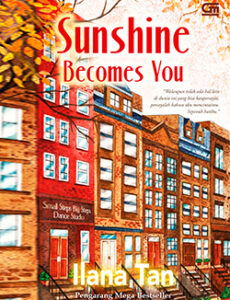2021 Participants
Juliana Tan
Past Program / 2021 Program / Juliana Tan
Hi, I’m Juliana Tan. I’m the executive editor for Asian Fiction in Translation at Gramedia Pustaka Utama. I acquire, edit, as well as oversee overall publication of translated books from Asian countries, including Korea.
Gramedia Pustaka Utama is the biggest publisher in Indonesia, and a subsidiary of a leading mass media corporation, Kompas Gramedia Group. Since it was established in 1974, our company has published numerous bestselling and acclaimed works from Indonesian authors as well as translated and published international bestsellers in the fiction, nonfiction, and children’s categories.
Foreign titles contribute to 60% of our publication which includes Harry Potter series. Twilight series, Hunger Games series, and extensive works from Agatha Christie, Paulo Coelho, Stephen King, J.R.R Tolkien, Keigo Higashino, and many more.
I’d like to take this opportunity to talk about “The Good Son” by Jeong You-jeong. We acquired this title back in 2016. At that time Western fiction was dominating the translated novels market in Indonesia.
But we started to notice the lack of enthusiasm for general translated novels. Our editorial team felt that we had to publish something new and fresh, but with a theme and setting that are not too unfamiliar that the Indonesian readers find it hard to relate. I thought we had to publish and translated novels from Asian countries.
Korean fiction was a good place to start, thanks to all the Korean wave effects in Indonesia. And I’d like to introduce to our market, a bestselling book in Korea that is not necessarily related to K-drama, but with a genre and theme that have a universal appeal. Who doesn’t love thriller and mystery? So I chose “The Good Son”.
I usually get information from literary agents, catalogues from Korean publishers, and newsletters sent by KPIPA or Publication Industry Promotion Agency of Korea. In addition, I frequently check bestseller list in Korean book market.
I first read about Jeong You-jeong’s “The Good Son” in one of KPIPA’s newsletters. I was intrigued by the storyline which delves into the mind of a psychopath. At that time, our publisher’s Asian division has not yet developed but we already had plans to expand it, so I thought this book would be a good way to start.
For me, one difficult point while working on Korean books is determining which spelling to use. Let me give you one example. The “어” sound. The romanization can be written as “eo” or “u”. I know that in English text, they usually use the “u” alphabet. like “Samsung”. But in Indonesian, the alphabet “u” is pronounced as “ooh”. So, if you write “Kim Jung-hwa” or “Hyun-ji”, most Indonesians will read it as “Kim Joong-hwa” or “Hyoon-ji”. I will always try to use the “eo” spelling but sometimes it depends on the authors or Korean publishers. Therefore, we never have a standardized spelling in our translated Korean novels.
The reader’s response for “The Good Son” is quite well considering at that time Asian fiction has not yet gained traction. So, to have a Korean thriller doing better than some of the Western counterparts in Indonesia, it’s really something. On Twitter, I saw some readers going crazy for the sentence: “Yoo-jin is a predator. A predator that belongs to the worst category among psychopaths.”
As for other Korean books, “Kim Ji-yeong, Born in 1982” by Cho Nam-joo is our megabestseller title. It gained a lot of exposure from the controversy in Korea that involves a K-pop idol, from the movie played by Gong Yoo who is well-loved in Indonesia and from the “me-too” movement that was sweeping Indonesia.
As for other Korean titles, a few of them are steadysellers such as “Please Look After Mom” by Shin Kyung-sook. but since most of our Korean books were, are, and will be published during the pandemic, we are currently developing different marketing campaigns to the ones we usually do. Since the pandemic calls for different marketing approach.
The translated Asian works in general are selling quite well in the last couple of years. For Korean books, nonfiction is doing better than fiction especially during the pandemic. The bestselling nonfiction works are dominated by self-help books.
As for Korean fiction, we are still expanding our range to gauge the readers’ interest. But for now, it’s still largely dependent on other exposures such as, being quoted or mentioned by K-pop idols on their social media accounts, or being made into films starring popular actors, or written by a celebrity. This can be seen from our bestselling titles such as Cho Nam-joo’s “Kim Ji-yeong, Born in 1982” and “Fish in the Water” which is written by Lee Chanhyuk, a K-pop star.
We are always interested in publishing Korean books. There aren’t any specific titles yet. But we have acquired several titles for next year publication and we are constantly looking for works that may appeal to Indonesian readers.
 | It’s Okay to Be Weak Today As Long As You Know When to Be Strong / PT Gramedia Pustaka Utama I’d like to promote a novel by one of the most beloved authors for the last 15 years in Indonesia. Ilana Tan. Just so you know, Ilana Tan never appears in public so we don’t know whether the author is a man, a woman, or a team of writers. |
